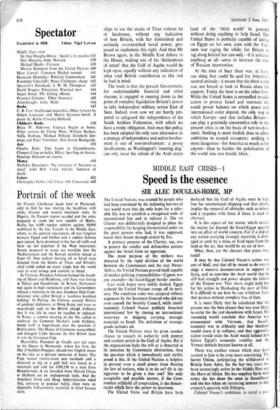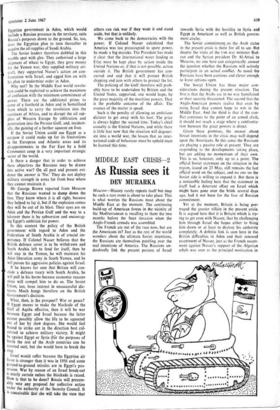Speed is the essence
MIDDLE EAST CRISIS-1 SIR ALEC DOUGLAS-HOME, MP
The United Nations was created by people who had been convinced by the sickening horrors of two world wars that the only hope for a toler- able life was to establish a recognised code of international law and to enforce it. The uN Charter was deliberately designed to place the responsibility for keeping international order on the great powers who had, it was supposed, learnt their lesson through ordeal by fire.
A primary purpose of the Charter, too, was to protect the smaller and defenceless nations against the threat from an aggressor.
The main purpose of the authors was thwarted by the rapid division of the world between the Communists and the rest. Never- theless, the United Nations proved itself capable of modest policing responsibilities—Cyprus was one example—the Israel-Egypt border another.
Last week hopes were rudely dashed. Egypt ordered the United Nations troops off its terri- tory. The expulsion order was accepted without argument by the Secretary-General who did not even consult the Security Council, while simul- taneously Colonel Nasser publicly breached international law by closing an international waterway to shipping carrying strategic materials to Israel. The definition of strategic goods includes oil.
The United Nations must be given another chance to reassert its authority with prompt and resolute action in the Gulf of Aqaba. But if the organisation lacks the will or is thwarted in its intention by Communist obstruction, then the question which is immediately and starkly posed is this. If the United Nations is helpless to prevent even a small power from flouting the law of nations, who is to do so? Or is the aggressor to be given a free run? The only acceptable and possible answer, if the Com- munists withhold all cooperation, is the democ- racies which have the power to intervene.
The United States and Britain have both
declared that the Gulf of Aqaba must be kept free for international shipping and that clearly implies the removal of obstacles such as mines, and a response with force if force is used to obstruct.
It is this aspect of the matter which carries the matter far beyond the Israel-Egypt quarrel into an affair of world concern. For if a ship of any nation carrying strategic materials is dam- aged or sunk by a mine, or fired upon from the land or the air, that would be an act of war.
What, then, are the chances that peace may hold?
It may be that Colonel Nasser's action was one of bluff, and that all he meant to do was to stage a massive demonstration in support of Syria, and to convince the Arab world that he still had strength and power despite the failure of the Yemen war. That thesis might hold but for his action in blockading the port of Ellat. It is difficult to see how he can withdraw from that posture without complete loss of face.
It is more likely that he calculated that the present was the best chance that was ever likely to occur for the real showdown with Israel. His reasoning would conclude that America was preoccupied with Vietnam, that Israel's economy was in difficulty and that blockade would cause it to collapse, and that aggressive action would unite the Arab world behind him before Egypt's economic troubles and the Yemeni debacle became known to all.
There was another reason which may 1:13%,2 seemed to him to be even more convincing. The Soviet Union, anticipating the withdrawal of Britain from Aden, for the last two years ha- been increasingly active in the Middle East and the Horn of Africa. She has supplied Syria with arms; she has done the same in Somaliland and she has taken an increasing interest in that country's quarrels with Ethiopia.
Colonel Nasser's ambitions to instal a pro-
Egyptian government in Aden, which would include a Russian presence in the territory, suits Russia's purposes down to the ground. So, too, does the Egyptian plan to turn thereafter to acquire the oil supplies of Saudi Arabia. The Soviet leaders therefore dabbled in this trouble spot with glee. They authorised a large shipment of wheat to Egypt, they gave money for the Yemen war, they supplied military air- craft, they supported Nasser's action on con- frontation with Israel, and egged him on with his plan to undermine order in Aden.
Why not? In the Middle East world revolu- tion could be exploited to achieve the maximum of confusion with the minimum commitment of power. There are the additional prizes to come of a foothold in Aden and in Somaliland from which to carry the revolution into the continent of Africa, and to disrupt the oil sup- plies of Western Europe by infiltration and penetration into the Persian Gulf, and, incident- ally, the gaining of a further squeeze on Iran.
If the Soviet Union could use Egypt as a catspaw it could make up for its frustrations in the European and Atlantic areas and its disappointments in the Far East by a bold Communist coup in a very important strategic sector of the world.
Is there a danger that in order to achieve these objectives the Russians may be drawn into active war? On all past and present evi- dence the answer is 'No.' They do not deploy military strength in areas far from base where they cannot maintain it.
Mr George Brown reported from Moscow that the Russians wanted to damp down the fuse. They know where it is all right, because they helped to lay it, but if the explosion comes they will be out of its blast. Their eyes are on Aden and the Persian Gulf and the way to a takeover there is by subversion and encourag- ing Egypt's ambition for power.
In this context the policy of the British government with regard to Aden and the Federation of South Arabia is of crucial im- portance. If Colonel Nasser believes that the British defence cover is to be withdrawn apd South Arabia left to fend for itself, then he will stay in the Yemen, he will maintain his Aden liberation army in South Yemen, and he will pursue his aggressive policies against Israel.
If he knows for sure that Britain will con- clude a defence treaty with South Arabia, he will pull in his horns because economic reasons alone will compel him to do so. The Soviet Union, too, loses interest in unsuccessful dic- tators. Much hangs therefore on the British Government's decision.
What, then, is the prospect? War or peace? If Egypt means to make the blockade of the Gulf of Aqaba effective, then it will be war between Egypt and Israel because the latter cannot possibly allow the life to be squeezed out of her by slow degrees. She would feel bound to strike out in- the direction best cal- culated to achieve military victory. It might be against Egypt or Syria (h3r the purposes of battle the rest of the Arab countries can be counted out), but she would have to break the ring.
Israel would suffer because the Egyptian air force is stronger than it was in 1956 and some ground-to-ground missiles are in Egypt's pos- session. War by reason of an Israel break-out is nearly certain unless the blockade is raised. How is that to be done? Russia will presum- ably veto any proposal for collective action under the authority of the Security Council. It is conceivable that-she will take the view that
others can risk war if they want it and stand aside, but that is unlikely.
We come back to the democracies with the power. If Colonel Nasser calculated that America was too preoccupied to spare power, he made a big mistake. The President has made it clear that the international water leading to Eilat must be kept clear by action inside the United Nations or, if that is not possible, action outside it. The British government has con- curred and said that it will protect British shipping and join with others to protect the lot.
The policing of the Gulf therefore will prob- ably have to be undertaken by Britain and the United States, supported, one would hope, by the great majority of the maritime powers. That is the probable outcome of the affair. The essence of the matter is speed.
Such is the penalty of allowing an ambitious dictator to get away with his loot. The price is always higher the second time. Today's chief casualty is the United Nations, and while there is little fear now that the situation will degener- ate into a world war, the lesson that an inter- national code of behaviour mustlie upheld must be learned this time.



































 Previous page
Previous page